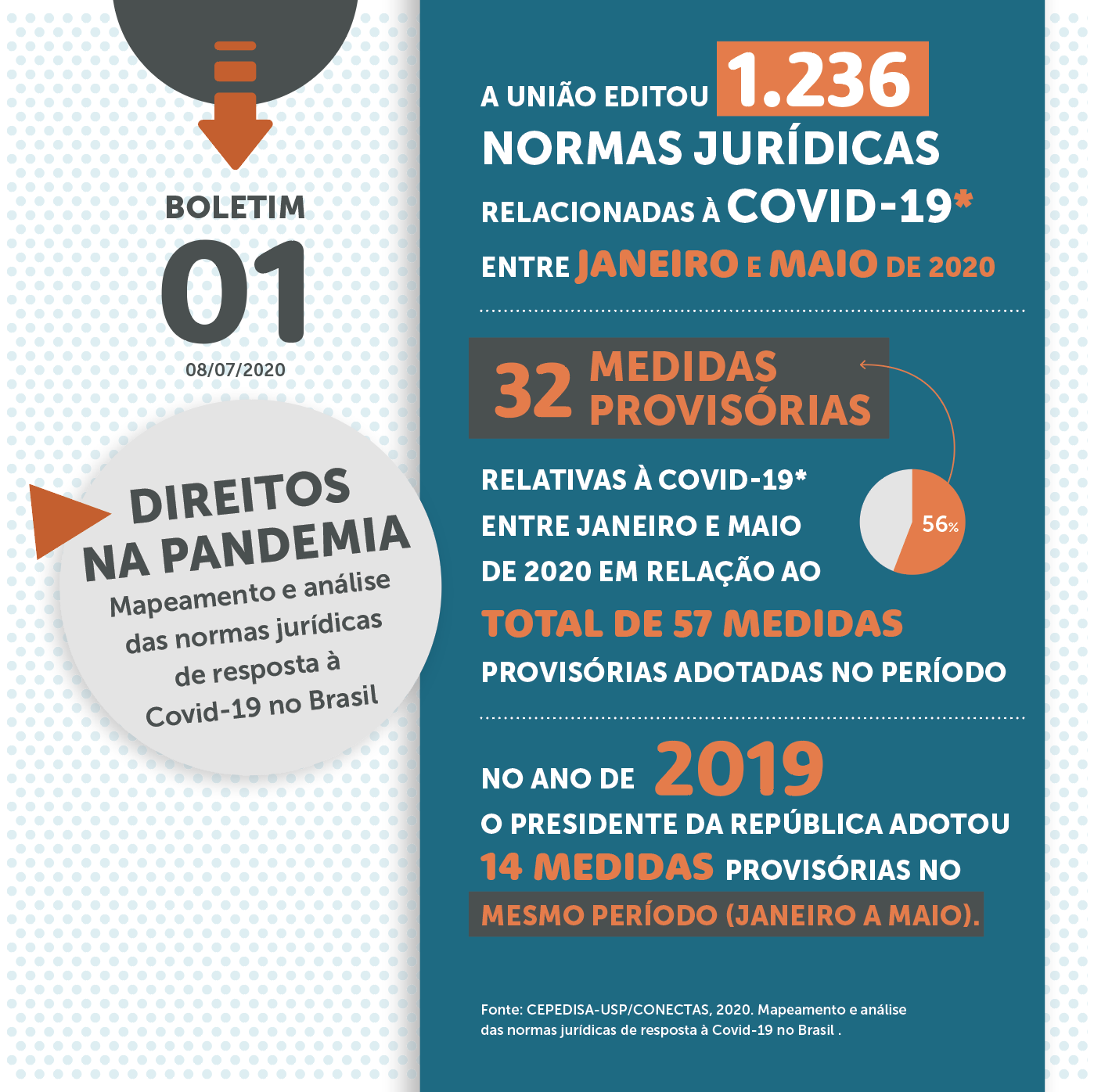Covid-19 propels number of rules issued by the federal government
Research by CEPEDISA and Conectas finds a total of 1,236 legal norms related to the pandemic issued by the federal government between January and May 2020

Between January and May 2020, the government of President Jair Bolsonaro and other federal bodies issued a total of 1,236 legal norms during the Covid-19 pandemic. This overall number includes decrees (705), resolutions (65), provisional measures (32) and executive orders (14), among others.
This is one of the results of the new study conducted by Cepedisa (Center for Studies and Research on Health Law) of the Faculty of Public Health at USP (University of São Paulo) in partnership with Conectas Human Rights. Based on research in the Federal Gazette and other official publications, the project “Mapping and analysis of the legal norms for responding to Covid-19 in Brazil” proposes to analyze all the legal norms in response to the Covid-19 pandemic in the country on the federal, state and municipal levels, and publish the result in bulletins published every two weeks.
The first issue of the Rights in the Pandemic Bulletin, which covered the period from January 1 to May 31, 2020, notes that the federal government issued 57 provisional measures, of which more than half (32) were norms related to the Covid-19 pandemic. This represents four times more than the number of provisional measures issued in the same period last year (14), at the start of the current administration.
Read more

According to the Cepedisa researcher Fernando Aith, the huge number of norms created by the Executive on Covid-19 has limited the role of the Legislative Branch and hindered the exercise of citizenship.
“Numerous sub-legal norms overstep the administrative sphere and create obligations for the general population in a fragmented and sometimes contradictory manner,” said Aith. “Furthermore, it promotes the judicialization of health care, since the compliance with the law of the norms issued by the Executive Branch is often challenged in the Judicial Branch,” he added.
Discrimination against Venezuelans
The Rights in the Pandemic Bulletin draws attention to the number of norms regulating the movement of people across borders. From January to May, there were 15 inter-ministerial decrees, most of them signed by the Office of the Chief of Staff and the ministries of Justice, Health and Infrastructure.
According to researcher Deisy Ventura, from Cepedisa, many of these decrees violate Brazilian laws and international treaties ratified by the country.
“We recognize the importance of tighter border restrictions as part of the efforts to contain the spread of the disease, but many of the measures adopted are disproportionate,” said Ventura.
On 22 May, the government issued Decree No. 255 that consolidated all restrictions on entry into the country. The decree discriminates specifically against Venezuelan citizens, banning their entry into Brazilian territory even when they have a residence permit or a Brazilian spouse or children. Decree No. 255/19 also establishes the possibility of summary deportation, which is forbidden by Brazilian law that guarantees migrants the right to a fair trial and the principle of due legal process.
“Most Venezuelans who come to Brazil do so as refugees, so the decree not only violates the Convention on the Status of Refugees but it also discriminates based on nationality, in violation of international treaties signed by Brazil, such as the aforementioned Convention, as well as the Brazilian Migration Law and the Federal Constitution itself, which establishes the principle of non-discrimination,” she added.
Currently, Decree No. 255 has been replaced by No. 340, which maintains the same problems identified in the previous decree.
About the Rights in the Pandemic Bulletin
Given the urgency that the Covid-19 pandemic has created in Brazil and around the world, the Rights in the Pandemic Bulletin proposes to conduct comprehensive research into all the legal and sub-legal norms issued by government in Brazil, whether on the federal, state or municipal level.
The project is being conducted by a multidisciplinary team and consists of documentary research to establish a database of norms, with the production of data for qualitative analysis of the potential impact on human rights, as well as the production of data for disaggregation and quantitative analysis, in particular cross-referencing data on the norms with epidemiological indicators.
The project proposes to analyze the impact of the new legislation on fundamental rights, so that it will be possible to monitor its effects in the medium and long term.
The publication released today also addresses questions about what a pandemic is and how a disease is named, and it compiles the 85 recommendations of the IACHR (Inter-American Commission on Human Rights) on how States should respond to the pandemic without violating rights.






